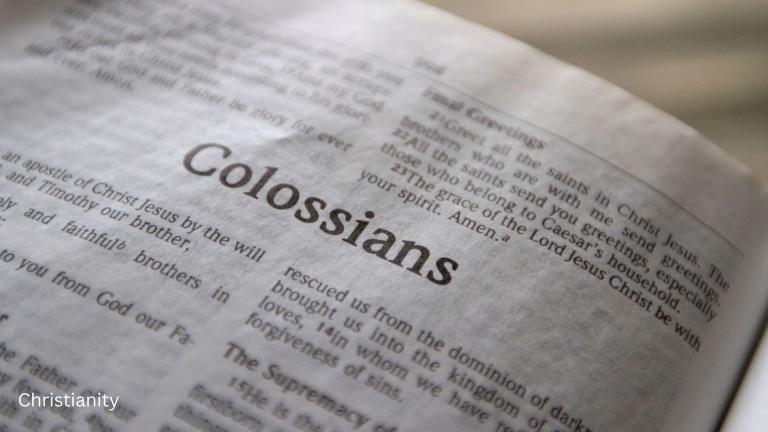
Monday: Read Colossians 1:1-14
Colossians is deemed a “twin” epistle along with Ephesians. As you read, you will notice that the language of Colossians is very similar to Ephesians. The key distinction between the two letters is that Ephesians focuses on the Church as the body of Christ, whereas Colossians focuses on Christ as the head of the body!
Colossians emphasizes the work of Christ in creating the community of God’s people. Christ has done so by making peace on the cross (see 1:20, 22).
The letter then lays out the implications of this fact. The ultimate result is that the New Creation has begun in Christ and that they (Gentile believers) “share in the inheritance of the saints” (12; i.e., with the Jewish believers).
Michael Gorman provides a great foundation for understanding Colossians, “Those who are part of this kingdom are one body; chosen by God; forgiven; practicing forgiveness, clothed with love and peace, called to create a harmonious peace-filled community as they allow the peace of Christ to rule in their hearts.”[2]
The letter begins with a customary greeting: Paul and Timothy (1) to the church in Colosse (2).
Then Paul has an extensive “thank you” to God (1:3-8). Paul’s thanks are centered on the deliverance of Christ from the power of darkness (1:13-14).
When Paul says that they have heard (he “heard” because Paul has never been to Colosse) of their “faith in Christ Jesus and the love which you have for all the saints” (4), he is reiterating the two great commandments!
When Paul says, “for this reason” (9), he means “in light of what God has done” he now prays for them. That is, 1:3-8 forms the basis of Paul’s prayer for them.
In his prayer, he asks “that you may be filled with the knowledge of His will” (9). As a result of this, Paul’s hope is that “you will walk in a manner worthy of the Lord” (10).
Questions to ponder/discuss:
- Sometimes it is just good to stop and thank God for what He has done. Too often we are too busy. Sometimes we don’t realize what God has done because we are ignorant. The reality is that the expression, “there but for the grace of God go I” is far more true than we realize. Spend some time thanking God and asking Him to help you see what it is that you have to thank Him for.
Tuesday: Read Colossians 1:15-20; See Prov 8:1-36
Today’s reading brings us to another of the classic hymns of the NT (alongside Phil 2:5-11). In this hymn, Christ is exalted alongside the Father. In fact, Paul (we have no way of knowing if he penned this or if he is citing it) applies to Jesus everything that is said of God/wisdom (Note: the hymn combines Gen 1:1 and Prov 8:22).
The hymn has two stanzas that are very much parallel to one another. The first stanza (15-17) says that Jesus is supreme over all creation: He is the “Firstborn over all creation” (15). The second stanza (18-20) notes that Jesus is supreme over the new creation: He is the “Firstborn from the dead” (18).
Thus, the hymn moves from creation (15-17) to New Creation (18-20). The result is, as NT Wright says, “God, man and the world are now to be understood in relation to Jesus Christ.”[3]
In sum, the hymn notes that Christ fulfills the purpose of reconciling all things to the Father. In addition, Jesus is the Father’s agent both in creation and redemption. He is also the Image of God. Christ makes the invisible God visible. As a result, He is Lord of the old and new creations.
Questions to ponder/discuss:
- Col 1:15-20 is a key text of the NT. Over the next few weeks memorize 1:15-20. As you meditate on it each day, take notes on what stands out.
- It is critical that we recognize that this hymn exalts Christ because of the Cross! Thus, it parallels Phil 2:5-11: God exalted Jesus because He was humbled on the Cross.
Wednesday: Read Colossians 1:21-23
Today’s brief reading is a reflection on the significance of what Paul has been saying since 1:13. Paul begins by noting that “you were formerly alienated and hostile in mind, engaged in evil deeds” (21). In being “hostile” in mind and deeds, Paul iterates that they were alienated from Christ in both their thoughts and their actions.
Yet, we have been reconciled through the Cross. The goal of our reconciliation is that we might be presented as “holy and blameless and beyond reproach” (22). God’s purpose is to create a Holy people! And this work began at the Cross.
When Paul says, If indeed you continue in the faith (23), he is indicating “since we continue.”
Questions to ponder/discuss:
- The implications of the Cross cannot be understated. When we struggle to be faithful to Christ it is because we have not considered well enough the implications of the Cross. This is what Paul will build upon in the chapters that follow. His message is “that is what you were. This is what you are.” Keep this in mind as you read and make notes as to what Paul says “we are.”
Thursday: Read Colossians 1:24-2:5
Paul now reflects on his ministry in Christ. He begins by noting that he rejoices in my sufferings for your sake (24). After all, he adds, “I do my share on behalf of His body, which is the church” (24). In fact, he believes that he is “filling up that which is lacking in Christ’s afflictions” (24). In order to understand what Paul is saying it is critical to understand the concept of the “Messianic woes.” The belief was that a sign of the coming age (hence, “Messianic”) is the suffering of the people of God (hence, “woes”).
One aspect of the Messianic woes is that the suffering of the people of God is a sign that they were members of God’s covenant community. Hence, Paul can rejoice in his sufferings! He is, in effect, saying, “I’m in.” But there is more.
The belief in the Messianic Woes also entails a conviction that there is an allotted measure of suffering that the people of God must endure before the end (or as they have come to find out, before the return of Christ). Thus, Paul says, “I do my share on behalf of His body, which is the church” (24). Paul seems to understand that the more he suffers the less others may have to.
In addition, he suggests that Christ’s afflictions did not complete the measured suffering of God’s people: thus, what “is lacking in Christ’s afflictions” (24). This may seem blasphemous but only because we have a weak understanding of the nature of the people of God. This statement has nothing to do with the efficacy of Christ’s work on the cross. That work is finished and fully effective. Paul is simply saying that when it comes to the full measure of the suffering of God’s people, Jesus’ death did not complete the task.
Paul adds that he has been made “a minister” by God so that he might “fully carry out the preaching of the Word of God” (25). Paul refers to this as a “Mystery” (26). In the NT, a “mystery” is always something that was hidden but is now revealed. In fact, it has been revealed to the people of God: which includes the Gentile believers All God’s people experience the presence of Christ within them, which Paul deems as,” the hope of glory” (27).
Paul then notes that it is Christ “we proclaim” (28). In proclaiming Christ, Paul has two goals. First, he intends to admonish everyone (28). And he aims to teach everyone (28).
The goal of all of Paul’s work is to “present every man [person] complete (NAS)/mature (ESV, NET)/perfect (NIV, NKJ, NLT) in Christ (28). Thus, he says, “for this purpose also I labor” (29).
Questions to ponder/discuss:
- We cannot gloss too quickly over 1:28-29. I often ask my students, “what is the goal of interpretation?” it is my belief that one of the key goals, though not the only one, is that we become “complete/mature/perfect in Christ.” Too often I think that perfection is not something we strive for. “Let’s just do our best”; or “hang in there God knows we are not perfect” is too often what strive for. I recall years ago an infamous bumper sticker that read, “Christians aren’t perfect, just forgiven.” And though there is a measure of truth here, I fear that it is too often used as a crutch to both excuse our sins and to resolve our minds to not seek the perfection to which we are called. Of course, such perfection can only happen when we rely on the Spirit.
- As you continue to read through the NT, resolve yourself to discern what being “complete/mature/perfect in Christ” means.
Friday: Read Colossians 2:6-23
This section is a well-organized argument. Paul begins with an appeal to them that just as they have come to know Christ, so they should “walk in Him” (6). After this initial charge, the main focus of Paul’s argument is contained in three admonishments.
In 2:8-15, Paul’s first warning is, “See to it that no one takes you captive through philosophy and empty deception, according to the tradition of men, according to the elementary principles of the world, rather than according to Christ” (2:8). Paul explains that the reason why we must avoid philosophy that is not centered on Christ is because (“for”; 9) “in Christ all the fullness of Deity dwells in bodily form.”
Second, Paul says that “no one is to act as your judge” (16). Though we are not certain what Paul is getting at, it appears that there were some Jewish influences that were judging the Gentile believers for not maintaining Jewish practices; such as “Sabbath” (16). For Paul, these things point us to Christ: “the substance” (17).
Third, Paul exhorts them to not let anyone defraud “you of the prize” (18). Whoever this group was and exactly what they were saying is uncertain. But it appears that their judgment on the Colossians was so strong that they were suggesting that those who fail to follow the Jewish practices were in danger of being disqualified from the kingdom of God. Paul’s response is that they too have died with Christ to such things (20).
Questions to ponder/discuss:
- Paul is responding to false teachings that have infiltrated the church in Colosse. He is not condemning all philosophy. Nor, is he saying that all philosophy that is not centered on Christ is necessarily wrong. He is addressing a particular philosophy that is leading some in Colosse astray. As Christians, we are called to discern all truth. But we must be careful of condemning others and their convictions simply because they don’t believe in Jesus. When we are closed-minded and unwilling to listen to others we fail to affirm individuals and their work. Could it be that what they are saying is true, but that they are at the same time missing the point on how it fits with the Gospel? Can you think of examples of things that non-Christians affirm that we as Christians can learn from (e.g., Galileo and Copernicus we rejected by the church)?
Our goal is to keep these posts free of charge. I do not intend to ever hide them behind a paywall. I can only do this if those of you who have been blessed by them and can afford to give ($5, $10, $25, or more/month) do so. You can give a tax-deductible contribution by following this link.
Please share this post and let others know about determinetruth.
If you wish to view this blog on your smartphone through the Determinetruth app simply download the “tithe.ly church” app on your smartphone and insert “determinetruth” as the church name you wish to follow. Once it is loaded, simply click on the “blog” icon and it will automatically load.
If you would like to have Rob speak at your church or organization in person or via zoom, please let us know by filling out the contact info on the Contact me tab on this site.
Remember that our friends at Hearts & Minds, an independent bookstore in central Pennsylvania, have offered to give our listeners a 20% off on nearly anything ordered. Just mention Determinetruth and they will get back to you promptly with personalized service like you rarely see these days.
Rob Dalrymple is married to his wife Toni and is the father of four fabulous children, and two grandchildren. He has been teaching and pastoring for over 33 years at colleges, seminaries, and the local church. He has a PhD (Westminster Theological Seminary) in biblical interpretation. He is the author of four books (including Follow the Lamb: A Guide to Reading, Understanding, and Applying the Book of Revelation & Understanding the New Testament and the End Times: Why it Matters) as well as numerous articles and other publications.
He is currently completing a commentary on the book of Revelation titled, “Revelation: a Love story” (Cascade Books, pending 2024).
[1] This guide is meant to be done either as a group study over the course of 2 or 4 meetings (Day 1-5; 6-10; 11-15; 16-20), or as a private devotion over the course of 4 weeks (or a calendar month—5 lessons per week).
[2] Gorman, Death of the Messiah, loc 4644.












